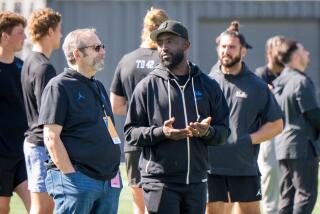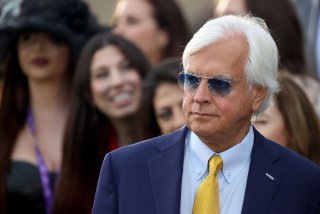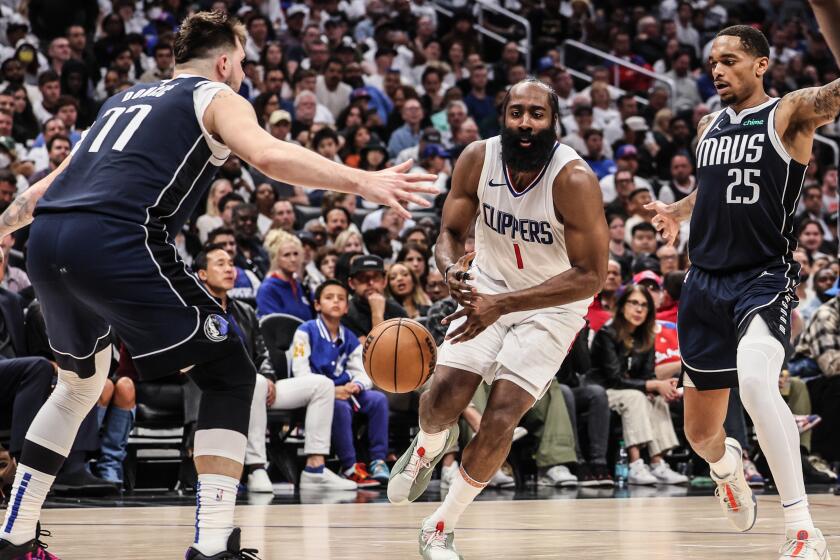A League, a City and the Art of the Deal
Bringing the NFL back to Los Angeles is on the agenda here the next two days as league owners convene for their annual May meetings. No news flash there. Groups interested in bringing a team back to the region have been flirting with the league ever since the Raiders and Rams left town more than 10 years ago.
Plenty of deals have been consummated, just none involving L.A., which has become a favorite leverage tool for franchises seeking more profitable stadium deals in their cities.
What will happen this time is almost anyone’s guess, but here’s a short refresher course of questions and answers pertaining to the key issues:
Question:: If the stadium derby ended today, what would be the order of finish?
Answer: The Coliseum, Anaheim and the Rose Bowl.
Q: Does the front-running Coliseum have a fatal flaw?
A: Possibly. NFL owners and executives don’t relish dealing with the Coliseum Commission, the nine-member board composed of city, county and state representatives. Nor is the NFL excited about returning to the Coliseum, even a reconstructed one. But the Coliseum does have the support of politicians, and that makes it very difficult to jump-start any other stadium concepts within the L.A. city limits.
The league’s rationale: If we’re going to pour half a billion dollars into an aging stadium, we don’t want another entity interfering with our ability to succeed.
Q: Is Carson completely of the picture?
A: Not necessarily. Some league executives still believe there will be a chance to revive the concept down the road. The NFL could circle back and obtain an option on the site if developer Steve Hopkins, who has plans to develop mixed-use housing and a shopping mall on the property, doesn’t close escrow in mid-December.
Q: Now that the TV deals are done, is putting a team back in the nation’s second-largest market the NFL’s top priority?
A: No. The top priority is extending the collective bargaining agreement between players and the league beyond 2008. But negotiations with the players’ union could affect the L.A. situation, because the league won’t want to spend $500 million to $600 million on a stadium here without rock-solid assurances that its economic structure will be intact for years to come. What if a player strike were just around the corner? What if players’ already huge salaries increase dramatically in the next five years?
The NFL Players Assn. and league headquarters both say they are confident of reaching agreement, and the television networks felt secure enough to pull the trigger on long-term deals. The holdup is among owners, who can’t seem to agree on what revenue streams the teams should be required to share.
Q: Is the clock ticking on the league?
A: No. This process is entirely on the NFL’s schedule. Owners won’t be rushed or forced into hasty decisions in a market where their teams have failed twice before. The best scenario for them is to have multiple sites prepared to negotiate and move forward concurrently. That way the league has maximum leverage. Because of that, it’s not such a big deal that one site is more ready than another.
Q: Is the clock ticking for L.A.?
A: Yes. Patience is wearing thin. People have grown tired of wondering whether or when the NFL will return. The more disenchanted fans get, the more disconnected from the NFL they feel. How many times is L.A. going to play Charlie Brown to the NFL’s football-yanking Lucy?
Q: Is the Rose Bowl a pretender or a contender?
A: We’ll find out soon. The Pasadena City Council has some big decisions to make when it reconvenes June 6, chiefly whether the benefits of pursuing the NFL outweigh the negative effect, and then whether to submit a proposal to the league. The council last week certified an environmental impact report on a renovated Rose Bowl, but the big decision is due in two weeks.
Q: Is there a particular person on the hot seat in Pasadena?
A: Yes. Council member Steve Madison represents the district that includes the stadium and the surrounding neighborhoods. He’s also the council’s swing vote on this issue. Madison has been a strong supporter of bringing an NFL team to the Rose Bowl, but he’s also getting a lot of pressure from worried constituents who think the league should look elsewhere. Should Madison vote in favor of pursuing a deal, he’ll make a lot of people angry -- and still face the distinct possibility that the league will eliminate the Rose Bowl down the road.
Q: If L.A. gets a team, will it be by relocation or expansion?
A: In the late 1990s, respondents to a survey of L.A.-area residents overwhelmingly favored a new franchise. Those folks are likely to be disappointed. All indications point to a team’s relocating. With a new TV deal worth more than $4 billion a season, owners don’t want another partner.
Besides, they still have problems with franchises in New Orleans, Minnesota, San Diego and Indianapolis that might be solved by a move to L.A.
Q: So will it be the L.A. Saints or L.A. Chargers?
A: Maybe both. The Saints have broken off negotiations with Louisiana over how much money the state should chip in to keep the team in New Orleans. Clearly, Saint owner Tom Benson is trying to keep his options open -- or at least scare the state into handing over more money. His attorney, Stanley Rosenberg, recently told the San Antonio Express-News that Benson had fielded several offers for the team, including one from L.A. Louisiana officials are making a last-ditch effort to arrange a meeting between Benson and Gov. Kathleen Blanco before the legislative session ends next month.
The Chargers’ new lease at Qualcomm Stadium allows them to talk with other cities starting Jan. 1, 2007, and to leave San Diego any time after the 2008 season, provided the team pays off the rest of the debt on the stadium. If the Chargers don’t get their new stadium initiative on next year’s ballot, they’ll be looking to leave. Could they be bound for Orange County? Consider this: Among the biggest contributors to Anaheim Mayor Curt Pringle’s campaign fund is Charger owner Alex Spanos.
Q: Could the Raiders return?
A: There’s always a chance, although the league isn’t likely to fork over a dime to help build a stadium for that franchise. A couple of years ago, the owners added a caveat to the G-3 stadium loan requirements: No loans for teams that are suing the league. It was a thinly veiled message to Raider owner Al Davis, who at the time was suing the league over the rights to the L.A. market. The league won that suit, then the decision was thrown out because of juror misconduct. Eventually, the original ruling was reinstated.
Q: When it comes to L.A., what’s the best move the NFL has made so far?
A: It told prospective ownership groups to back off, at least for the moment. In the last go-round, battling billionaires who attached themselves to sites and stadium concepts only clouded the picture. Now, if prospective ownership discussions are underway -- and you can bet they are -- they’re deep in the background. Picking a site comes first.
In the late 1990s, when several L.A. groups were courting the league, things got nasty. It was as if the groups preferred that the league not return to the choosing of a competing concept. Steve Tisch, a successful movie producer whose father, Bob, owns half of the New York Giants, said that when it came to fiercely competitive environments, few places compared to L.A.
“In L.A., people don’t hope for their rivals to fail,” Tisch said. “They hope for them to die.”
More to Read
Get our high school sports newsletter
Prep Rally is devoted to the SoCal high school sports experience, bringing you scores, stories and a behind-the-scenes look at what makes prep sports so popular.
You may occasionally receive promotional content from the Los Angeles Times.







